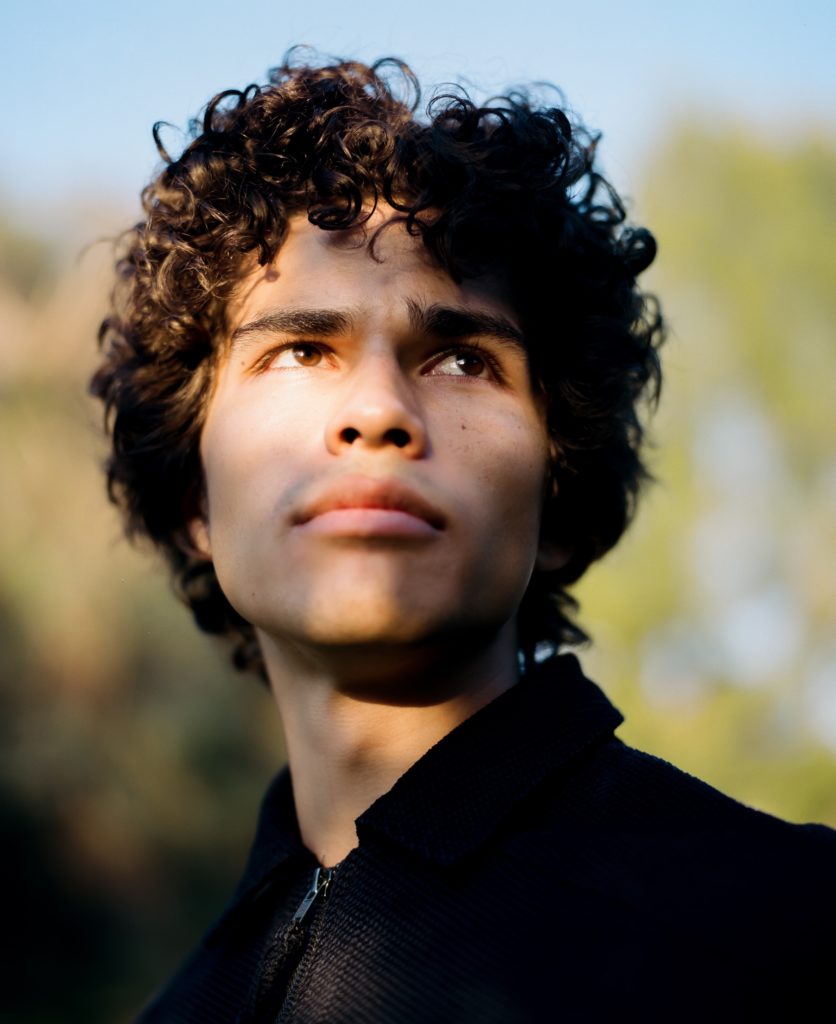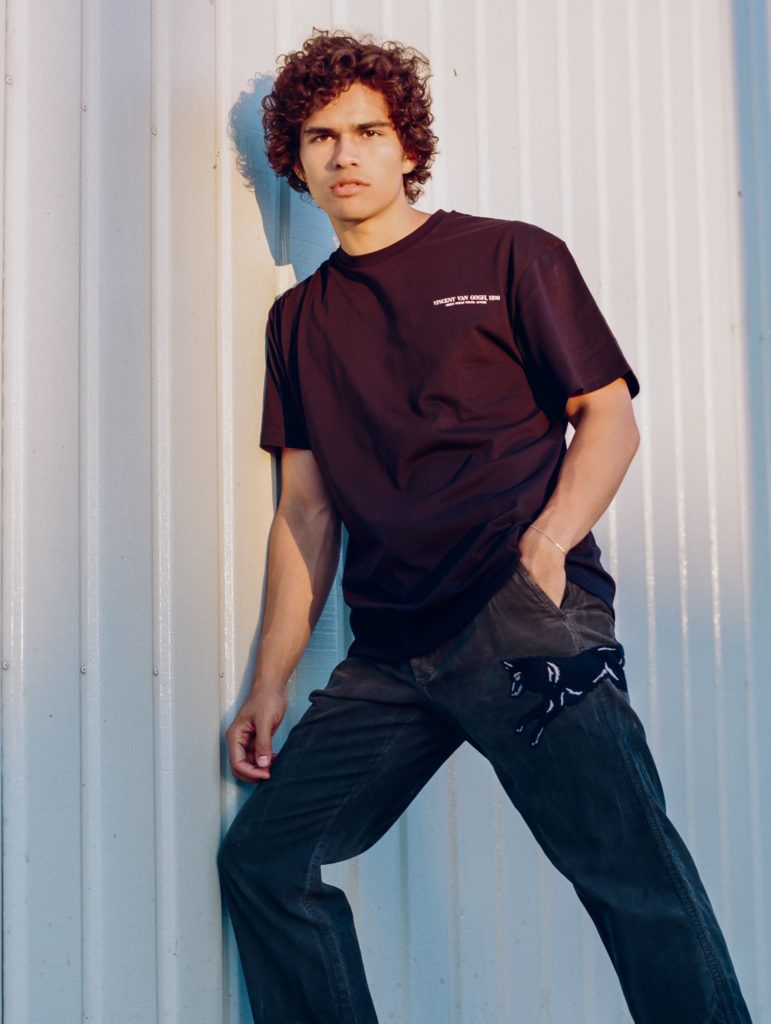Publishing date: Jul, 22, 2020
Singer, producer, actor, YouTuber Alex Aiono first gained recognition, amassing a following in the millions, via his YouTube channel where he shares acoustic covers, mashups, and even the occasional cooking video. Following a handful of independent single and EP releases, Interscope was quick to sign the rising star in 2017, with his single “Work The Middle” cracking the Spotify Viral 50 chart.
Aiono, who has since gone independent, credits the invention of his sound to his many song covers and mashups and compares the discovery of it to figuring out what your favourite foods are. “You have to try everything to figure out what you don’t like, figure out what you do like,” the self-proclaimed foodie tells us. “I listened to everything—I remember going through a phase where all I listened to was Metallica, I remember a Led Zeppelin phase, and then I went and immediately switched over to Wu-Tang Clan. It’s trying out all of the things and learning what you like, what you don’t like, what you love, and what you identify with so that you can make it your own.” That sound, which he defines as “soulful,” is at its peak on his new album, The Gospel at 23, releasing this July 24. The album is a collection of songs that have Aiono wearing his heart on his sleeve, telling the stories of his personal struggles and discoveries alongside a Philadelphia gospel choir.
Not only can we look forward to the release of The Gospel at 23 in the coming days, but we can also expect to see the artist gracing our screens with the upcoming release of Netflix’s Finding Ohana. A family movie that stars Aiono as one of its main characters, Ioane. We discussed Aiono’s acting career, his forthcoming album, and the importance of mental breaks below.
Where did your interest in music first begin?
[Growing up], I remember my mom telling me stories of how she used to wait in line at concerts, and how she’d be a major fan of artists. My dad played everything from Luther Vandross to Lauryn Hill to John Legend to Robin Thicke when I was a kid, and [I fell] in love with the passion in which those artists sang with and expressed themselves. I identified with that pretty quickly, and it was so natural for me to sing along to the words. I remember there was that song, “Send You My Love” by the Born Jamericans. That was one of the first songs that I was like ‘yo, this is me!’ Connecting with the emotions in artists made me identify with music and made me passionate about it from such an early age.

How would you describe your sound?
Oh, man. The word I immediately think of is soulful, and I don’t think of it soulful as in the sound of the music, but soulful more in the sense that I speak directly from my soul. When I describe my music, it’s less of a sound thing. Bruno Mars did a great job breaking the barrier with if you’re an artist, you have to [create] one specific sound. The same with The 1975 and Drake, they’re artists that transcend what sound is. What you can expect from me, especially with this album, is [me] pouring my heart out. I’ve put everything that I have into this music.
You’re close to the release date for The Gospel at 23. Are you nervous at all?
Oh, hell yeah [laughs]. I mean, I remember writing these lyrics, and it was even nerve-racking to say them to the co-writers in the room. Let me pull one out from the record; in “These Emotions,” I say, skeletons in my closet, they keep knocking, and sometimes I want to join them. If you think about that, that’s a pretty sad and deep thought that expressed something that, as a human being, I have felt in life and most likely will feel again at some point. Lines in “Old AF”: 18 years old, I really thought I was going to hell. I had to binge every sin just to see for myself.
I credit my team, my friends, my family, my co-writers, my producers, and everybody [who] helped hold my hand and say, ‘It’s okay to feel like this, it’s okay to say what you feel.’ People will love you and respect you for being honest more than if you try and write some mumbo jumbo.
You have done an incredible job of using your social platforms to release music while also giving your fans a chance to get to know you. What first made you realize that this was the best way to connect with your fanbase?
I’ll tell you exactly what it was because I know. I’ve always hated that social media is just everybody’s highlight reels. For some reason, we always compare our lowest moments to everyone’s highlight reels. The moment I realized that I am so much more effective when I tell people what’s going on in my life was last year. I hit a spot where I felt unmotivated, I felt dark, I felt heavy, I felt like everything I did I was doing with a 50lb vest. I told my team about it, and they [said to] take the weekend and disconnect from the world. I had never done that.
I remember posting because I was like, I need to explain. So I wrote this [message], and as soon as I posted it, I turned my phones off. When I came back from that weekend, I had not only seen the positive outreach to me [for] support, but I also received so many messages of people saying thank you for normalizing something like a mental health break. It’s not like I am the first person who has ever done it, but that was one of the first times I realized that the more honest I am, the more I can connect with people.
Besides disconnecting, what do you do to get through a creative block?
I love talking, honestly. One of the biggest things for me recently is trying to focus on emotionally ventilating and saying, ‘this is how I’m feeling, I don’t know what to do about it.’ In those dark moments, you feel so isolated; you feel locked in a tower where no one is even around to hear you scream. By vocalizing your feelings, confiding in friends, confiding in therapists or advisors or teachers or parents, you make it a little less isolating. I know that doesn’t solve everything, sometimes it won’t solve anything, but it never hurts to at least express and have people be aware of who you are and how you are.
 What do you hope your fans take away from this album?
What do you hope your fans take away from this album?
I always start small. To me, if one person feels helped or related to then this whole album was worth it—every dollar I put into it, every effort, all the late nights, [and] that’s the minimum. At maximum, I would love for people to feel a nice boost in momentum in fighting for what is good. As I look back and I discuss with my friends about what we need as a world, obviously we need to be united, we need to have a clear sense of what is right and what is wrong, and we need to make right for things that are wrong. And so if this album can participate in motivating and influencing that then that would be amazing.
Switching gears, let’s talk about your role in Netflix’s upcoming film, Finding Ohana. How did this first come to be?
I want to give the biggest shoutout to Peter DeSantis, my acting agent, and a big shoutout to Billy Mann and Liz Baylog at Manncomm, my management agency. Acting was something that I loved doing, you know, I was lucky enough to book [YouTube series] Royal Crush when I was 18 years old, but I never really had that full confidence. But even when I didn’t think that, Bill, Liz, Peter, my agency at UTA, everybody, they believed in it. They put me in the room with [the director] Jude Weng and [the executive producer] Irene Yeung, and we just had such a good time. As I booked the role, I was on cloud nine. I had never thought of myself like a Leonardo DiCaprio or like a Ryan Reynolds, more so like a Justin Timberlake where it’s like, once my music career is in a place that I feel comfortable, then I can explore [acting]—but now look where I am. I feel lucky.
How does your creative process differ between music and acting?
The most successful musicians are relentlessly themselves. I love The Gospel at 23 because it reeks of me, it’s me from top to bottom. When you’re acting, you’re being somebody else [laughs]. You have to draw inspiration from your real-life experiences, like, let’s say in the movie I’m disappointed, I need to think about a time when I was disappointed [in real life]. Jude Weng, who I love with my whole heart, did such a good job helping to find out how I can do that. Even the other actors and actresses on set were so great at helping me. For a lot of us, it was our first time on a movie set, so it was just a great experience. I love that I got to do that, and then I got to come home and work on my album. The constant change of things makes me feel like a crossover between James Bond and Willy Wonka [laughs]. It’s the coolest collaborative feeling. It might not make any sense to anyone else, but that’s how I feel [laughs].
